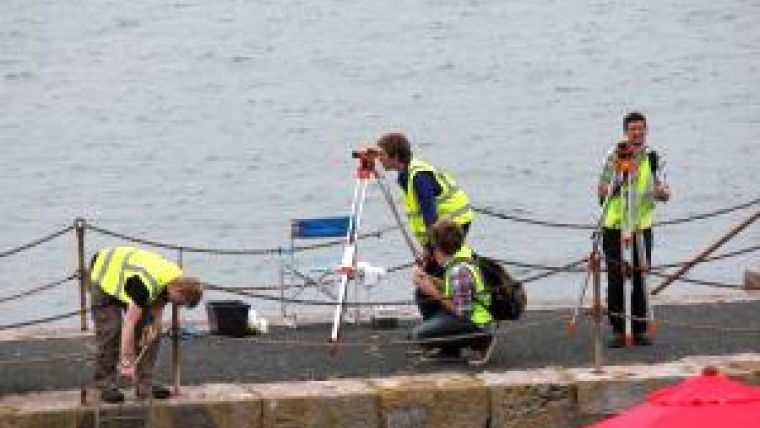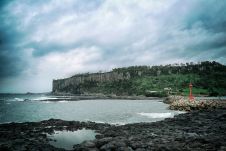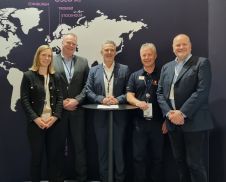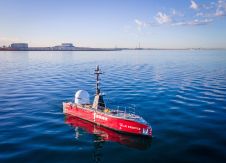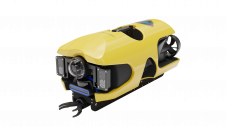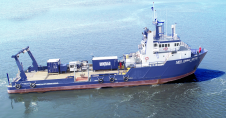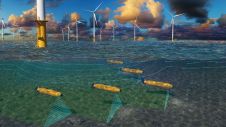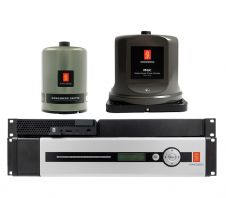Taking your University to Work
Hydrographic Academy with Plymouth University
Solving issues with the future supply of hydrographic surveyors, the retention of existing staff, and the limited number of surveyors working within the industry who are formally qualified and professionally accredited to do their job requires training and education. The Hydrographic Academy takes studying with Plymouth University offshore.
The offshore industry is facing an increasing threat to its success. Despite a relentless advance in technology and a globally buoyant market place, there are insufficient hydrographic surveyors being supplied from universities to satisfy demand. Historically, surveyors entered the industry once they had completed training and service in the Navy or had completed one of a handful of recognised higher education courses worldwide; the majority of the latter being targeted at a relatively small number of eligible postgraduates. There are very few undergraduate level courses which are professionally recognised apart from Plymouth University’s three year full-time BSc (Hons) Ocean Exploration, which is an IHO Cat A course, whilst several well respected university hydrographic survey programmes around the world have closed over the last few years.
Qualifications
The issue is exacerbated further as many personnel currently working as hydrographic surveyors are doing so on the basis of experience alone, or have often completed a university course in an allied subject such as geomatics or marine science. There are, therefore, relatively few surveyors within the workforce who have completed an accredited IHO Cat A and Cat B programme. In today’s increasingly litigious world, higher education level qualifications and professional body approval as a measure of fitness to work are becoming important.
Plymouth University has undertaken a programme of educational development to address these issues, and formed the Hydrographic Academy in 2011. The Hydrographic Academy has developed a fully integrated part-time e-learning solution to train and educate hydrographic surveyors in the workplace. Clearly, in such a high-value, short-staffed industry it is not normally viable for companies to release their personnel for, say, 12 months for full-time study to gain a postgraduate qualification and appropriate professional body recognition; so the option of part-time blended learning, whereby students study distance e-learning modules and then attend short, intensive residential practical sessions, is enabling many who would otherwise have no opportunity to engage with a university course.
Undergraduate and Postgraduate
The Hydrographic Academy offers both postgraduate and undergraduate programmes of study, the latter facilitating a route for school leavers into the industry. Organisations such as the IHO, IMarEST, CICES and RICS are fully engaged in advanced discussions regarding professional recognition, and Fugro and the Royal Navy are acting as industrial advisers and representatives to the Hydrographic Academy’s programme design and development. In this way, students and employers alike can be assured that the teaching and learning materials are relevant to today’s working environment. For example, as well as gaining practical and applied knowledge in typical subjects such as geodesy, positioning and acoustics, a student’s skill set is broadened with elements of management and leadership training, facilitating career development opportunities within the industry.
Total Learning Package
Delivery of the Hydrographic Academy’s teaching and learning materials has been designed carefully by the learning technology team at Plymouth University to provide an easily navigable route through the subject matter. The Total Learning Package (TLP) is supplied on a USB memory stick, and presents the student with a familiar HTML-type, web browser environment making it second nature for anyone familiar with the internet to navigate. Seamless integration with online materials can be achieved as and when an internet connection is available, but critically, the TLP is designed to work effectively offline and does not require students to have an internet connection. An important aspect of the overall teaching and learning design, this means that a student can be deployed offshore for extended periods and still continue their studies effectively, as all the lecture and support materials are contained within the TLP. Full personal tutor support is provided to each student, with regular contact through e-mail, video conferencing or telephone as appropriate.
It is critical that teaching and learning design for distance learning students pays due regard to the mode of delivery. It is thus wholly inappropriate and ineffectual to merely repackage existing lecture material from full-time residential courses. All learning materials have to meet the learning styles and preferences of different types of students, be able to be used by students across platforms and differing levels of technology, be portable, maintain rigorous academic standards and encourage discussion, debate and critical thinking. A typical distance learning module within the Hydrographic Academy programme would require between 100-300 hours of study. During this time a student would experience a variety of modes of learning, including listening to a series of short, narrated PowerPoint lectures of typically less than 20 minutes each, completing a selection of challenging self-test formative questions, conducting some directed background reading which may be supplied as part of the TLP or may have to be downloaded when internet connection allows, completing practical exercises, and research for the production of an essay or report on a subject related to a lecture or series of lectures.
E-Learning and Residential Elements
Clearly, an effective hydrographic surveyor cannot be trained through distance education alone, and the Hydrographic Academy’s programmes each include two intensive residential practical sessions of two weeks’ duration. These enable students to hone their practical surveying skills using cutting edge equipment, as well as undertake classroom-based learning in subjects such as advanced mathematics. Formal written examinations and skills-based assessments are also completed during these sessions.
The requirement for more training and education in hydrography, including to facilitate capacity building, is gaining wider recognition, and recent themes promoted within the industry such as ‘Taking Care of the Sea’ and ‘The Blue Economy’ are providing a much needed focus on important issues separate to those related solely to technological developments. Ensuring that those working within the industry are appropriately trained, educated and certified; making sure the next generation of employees are able to access the education they need, when and where they need it, are all critical. The Hydrographic Academy provides an opportunity for employers and employees to engage with higher education, and address these issues. Uptake from sponsored and self-funding students on the Hydrographic Academy’s programmes has been very encouraging to date, and already nearly 100 students are underway on their journey towards full qualification and accreditation.

Value staying current with hydrography?
Stay on the map with our expertly curated newsletters.
We provide educational insights, industry updates, and inspiring stories from the world of hydrography to help you learn, grow, and navigate your field with confidence. Don't miss out - subscribe today and ensure you're always informed, educated, and inspired by the latest in hydrographic technology and research.
Choose your newsletter(s)
